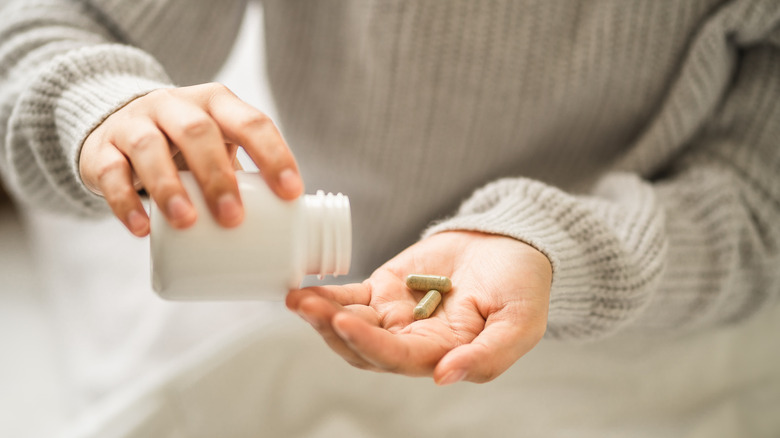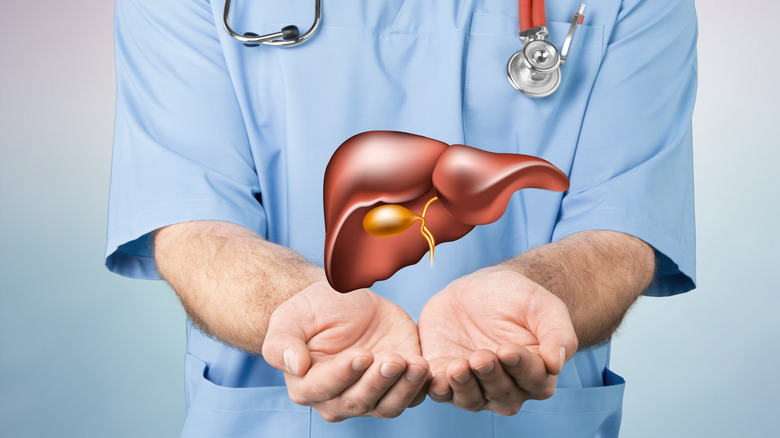What Really Happens When You Take Cinnamon Pills
Cinnamon is full of health benefits — some of which may fly under the radar (via Trends in Food Science & Technology). Widely celebrated as a "super food," the aromatic spice has more to offer than sprinkles for your hot chocolate. It's been used in both cooking and medicine dating back centuries. Cinnamon quills are derived from the inner bark of a tropical tree that's native to India, Sri Lanka, and the Mediterranean region (via Clinical Nutrition).
Cinnamon pills are the supplement form of the powdered condiment that most people are familiar with, according to Dr. Axe. Being a more concentrated version, they usually have a higher nutritional content than 1 teaspoon of ground cinnamon stirred into your porridge or smoothie.
Adding cinnamon pills to your regimen could help boost your well-being and reduce the likelihood of certain illnesses (per Clinical Nutrition). But they don't come without health risks, especially if you take too many, explains Dr. Axe. Read on to find out how cinnamon pills can affect your body and brain.
The two main types of cinnamon
A staple in most kitchens, cinnamon is hard to miss with its distinctive flavor and odor. What many people don't know is that the ancient spice comes in various forms, and there are more than 250 species of the cinnamon plant (via Plants, People, Planet).
Cinnamon mainly comes from four different countries: China, Indonesia, Vietnam, and Sri Lanka (via Pharmacognosy Research). There are two main types — cassia cinnamon and Ceylon cinnamon — which are quite distinct in their taste, appearance, and chemical composition. Ceylon cinnamon, also known as "true cinnamon," was originally discovered in Sri Lanka, but is now enjoyed all over the world.
Cassia is the form of cinnamon that you're probably most familiar with (via Plants, People, Planet). It has an intense flavor with a bitter aftertaste and a reddish brown color when ground. Ceylon has a more subdued and delicate flavor and texture compared to cassia. Ceylon cinnamon is also more expensive. It's considered to be superior because it contains a lot less coumarin, which is a compound that can be toxic when consumed in large amounts.
The recommended dosage
The standard recommended dosage of cinnamon pills is between 2 and 4 grams per day, notes Dr. Axe. This is equivalent to around a 1/2 or 1 teaspoon of ground cinnamon. However, the research around cinnamon pills is still young, which means that the best recommended dosage hasn't yet been properly established. Studies have shown that some people can safely take up to 6 grams per day to manage their diabetes (via the Journal of the Academy of Nutrition and Dietetics).
People are advised to take their cinnamon supplements with "carbohydrate-containing meals" to ensure optimum absorption (per Dr. Axe). Cassia cinnamon should be consumed with caution, warn researchers, since it has a much higher concentration of coumarin, which can be carcinogenic (via Plants, People, Planet). Even sprinkling cassia cinnamon onto your porridge a few times a week or over-indulging with cinnamon tea could exceed your recommended intake of coumarin. And it's important to bear in mind that the authenticity of some Ceylon cinnamon products sold at markets or online isn't always guaranteed.
Risks and side effects associated with cinnamon pills
Before delving into the myriad benefits of cinnamon pills, it's important to pay attention to their possible side effects. Some people have a sensitivity or allergy to the fragrant spice, reports the National Center for Complementary and Integrative Health. This can cause gastrointestinal problems or other allergic reactions.
Intact pills could irritate the mouth and lips and inflame the throat, warns Dr. Axe. Some people have reported adverse reactions to cinnamon-flavored substances like chewing gum (via Journal of Dermatological Case Reports). These products have resulted in mouth sores, burning and itching sensations, and white mucous patches on the tongue.
Cinnamon pills could clash with certain medications, such as antibiotics, blood thinners, and diabetes drugs. Because there's not a lot of research on how they could affect pregnant or breastfeeding women "pregnant and breastfeeding women are usually advised not to take cinnamon pills" (per Dr. Axe).
As with most supplements, cinnamon pills may veer toward unhealthy when consumed in excess, per the National Center for Complementary and Integrative Health. So, it's important not to overdo it. Experts recommend that you do some research and speak to your doctor before committing to a course of cinnamon supplementation.
They may help protect your brain
The neuroprotective properties of cinnamon haven't yet been widely documented, but there's evidence that cinnamon pills could be used as a cognitive enhancer (via Pharmacognosy Research). Cinnamon is said to contain phytochemicals, which boost your brain's ability to make use of glucose. They also reduce oxidative stress, which is when free radicals damage and destroy brain cells. Cinnamon pills could slow down and possibly even prevent the onset of Alzheimer's disease. Cinnamaldehyde is a special ingredient in cinnamon that may help delay the progression of dementia, according to a 2018 study published in Pharmacological Research. This is what gives cinnamon its unmistakable flavor and sweet, earthy scent. The organic compound is believed to help fight off the accumulation of toxic plaques and tangles in the brain, which are some of the key features of Alzheimer's disease.
Taking cinnamon pills after traumatic brain injury could decrease inflammation and oxidative damage (via Neural Regeneration Research). Though, the research around cinnamon's ability to ward off neurological decline is still in its early stages.
They reduce inflammation
Cinnamon is one of the oldest spices in the world, yet, little is known about its anti-inflammatory qualities (via Pharmacognosy Research). There are a few compounds in cinnamon that may help prevent and lower inflammation in the body, including trans-cinnamaldehyde, caryophyllene oxide, eugenol, and L-borneol.
The pantry staple is also rich in phenolic compounds like flavonoids and polyphenols, according to a study published in the Journal of AOAC International discovered. These naturally-occurring chemicals have been used to treat and manage inflammation and related diseases for centuries (via Molecules).
Due to its anti-inflammatory properties, cinnamon may help ease the symptoms of chronic rheumatoid arthritis. In a study published in the Journal of the American College of Nutrition, women with the inflammatory condition were given four capsules of 500 milligrams of cinnamon powder a day. After eight weeks, they saw notable improvements in their joints, experiencing less tenderness and swelling, as well as lower blood pressure readings.
They can help control your blood sugar
Cinnamon is probably most famous for its anti-diabetic effects (via Journal of Diabetes & Metabolic Disorders). There's evidence that cinnamon pills can help treat type 1 diabetes by reducing blood glucose levels in some patients.
Several studies have shown that cinnamon pills are also beneficial in treating type 2 diabetes (via Pharmacognosy Research). In a study published in the journal Diabetology International, subjects with type 2 diabetes experienced a drop in blood sugar and A1C levels after taking cinnamon capsules for 60 days. The supplement is particularly therapeutic for those who have a high body mass index (BMI), according to Clinical Nutrition.
Cinnamon pills work their magic by regulating individuals' insulin resistance (via Pharmacognosy Research). They can help people with diabetes better control their condition by improving and managing their fluctuating blood sugar levels. However, too many cinnamon pills could also make your blood sugar levels plummet, so it's important not to overdo it, particularly if you're vulnerable to hypotension.
Cinnamon pills shouldn't replace your type 2 diabetes medications, advises the American Diabetes Association. More research is needed to truly understand their effectiveness.
They could help relieve menstrual cramps
Steeped in ancient wisdom, cinnamon pills may help treat some of those monthly menstrual woes, according to research (via the Journal of Traditional and Complementary Medicine). The supplements have been used as an effective treatment for women with PCOS. This isn't surprising given that cinnamon improves the body's ability to regulate blood sugar and reduce insulin sensitivity. As a result, they can balance out hormones and improve menstrual cyclicity in women (via American Journal of Obstetrics and Gynecology).
The brown baking spice may also hold the key to menstrual pain relief. In a study published in the Iranian Red Crescent Medical Journal, 76 college-aged women took two cinnamon capsules three times a day during the first three days of their periods. This dosage helped turn down the intensity of their menstrual cramps compared to participants who were given placebo pills.
The pills also helped alleviate other unpleasant PMS symptoms like nausea, while the women reported less bleeding during the first few days of their cycle (via Iranian Red Crescent Medical Journal).
May help remedy migraines
Cinnamon pills can also bring down migraines. A 2020 study published in Phytotherapy Research found that taking three capsules of 600 milligrams (about 1/4 teaspoon) a day was enough to relieve migraine attacks in some patients. Over the course of two months, the supplements helped lessen the severity, frequency, and duration of headaches.
It's been suggested that cinnamaldehyde — cinnamon's healing bioactive ingredient — acts as an anti-inflammatory in the brain (via Avicenna Journal of Phytomedicine). In doing so, the compound inhibits the inflammation that's responsible for setting off painful migraine episodes. Some researchers have proposed that cinnamon pills could serve as a natural alternative to pain medications.
On the flip side, cinnamon contains salicylate, a chemical that's also found in aspirin, per Healthline. Although salicylate generally helps get rid of pain, it can also aggravate and trigger headaches in some people when consumed in large amounts.
Soothe an upset stomach
Cinnamon has been used medicinally for digestive issues in various cultures (via BMC Complementary and Alternative Medicine). As a natural anti-inflammatory, it can have a cooling, soothing effect on your stomach, reveals a study published in the journal Scientific Reports. Not only can it reduce stomach acid and gas, the super-condiment can cool your body by two degrees. As a result, taking cinnamon pills on a daily basis could help support your digestive functions and maintain the integrity of your gut lining.
There's evidence that cinnamon may exert antimicrobial effects against bacteria. Cinnamon pills could help keep your intestinal tract healthy by getting rid of the bad bacteria and building up the friendly bacteria that live in your gut, explains BMC Complementary and Alternative Medicine. By creating a balanced microbiome, cinnamon pills may resolve some of your tummy issues and help boost your overall health.
They can lower cholesterol levels
The cholesterol-lowering effects of cinnamon supplements have been highlighted in a number of studies (via Evidence-Based Complementary and Alternative Medicine). Some researchers have found that when people with type 2 diabetes take cinnamon pills (between 1 and 6 grams of cinnamon per day), they experience a drop in cholesterol levels. They also have lower fasting glucose and triglyceride levels.
A daily dose of cinnamon can help multiply the "good" cholesterol in your body, according to a study published in the Journal of Clinical Lipidology. The popular spice is a rich botanical source of polyphenols that have been shown to improve your blood lipid profile.
High cholesterol is a major risk factor for compromised cardiovascular health (via Evidence-Based Complementary and Alternative Medicine). It's not surprising, then, that cinnamon pills may also help treat and lower your risk of cardiovascular problems, protecting against conditions like coronary heart disease and stroke (via Food & Function).
Cinnamon pills can help people manage their weight
Cinnamon is thought to help people manage their weight in a number of ways (via Pharmacognosy Research). Taking cinnamon pills can stabilize blood sugar levels. In turn, this can help increase feelings of fullness and curb cravings, so that people are able to make healthier food choices overall.
Research indicates that the anti-diabetic spice has insulin-like activities in the body — it helps transport glucose from your bloodstream to your cells to be used as energy (via Pharmacognosy Research).
Another way that cinnamon pills may lower post-meal sugar levels is by blocking the activity of certain intestinal and pancreatic digestive enzymes (via Plant Foods for Human Nutrition). This slows down the metabolism of carbohydrates and keeps your blood glucose and insulin at reasonable levels.
According to a review study published in Clinical Nutrition, people who took 2 grams of cinnamon pills for at least 12 weeks saw a reduction in body weight, fat mass, and waist circumference. The herbal supplement might be particularly useful for those with a high body mass index (BMI) and could be an effective weight management aid, concluded the researchers.
They might damage your liver
Cinnamon is a natural product that's generally safe to use. The plant has served culinary, cosmetic, and medicinal purposes across various cultures. Still, the supplements should be consumed in moderation (via Trends in Food Science & Technology).
Eating lots of cassia cinnamon, in particular, can be harmful, especially if you have liver problems (via Frontiers in Pharmacology). This is because coumarin — noted earlier in the article as an ingredient abundant in cassia cinnamon — can be carcinogenic. Studies have shown that the substance can cause liver toxicity and dysfunction when ingested in large quantities. Ceylon cinnamon contains only trace amounts of coumarin (via The Scientific World Journal).
The National Center for Complementary and Integrative Health recommends that you speak to your doctor before taking cinnamon pills for your symptoms. If you're on medications that might affect your liver, cinnamon pills could elevate your risk of liver damage.
They help lower your blood pressure
While too much cinnamon can play havoc with your health, the right amount may do wonders for your blood pressure. In a study published in the Journal of the American College of Nutrition, 2,000 milligrams of cinnamon capsules per day for eight weeks led to lower systolic and diastolic blood pressure in women with rheumatoid arthritis.
Another study found that short-term consumption of cinnamon supplements brought down both systolic and diastolic blood pressure in patients with prediabetes and type 2 diabetes (via Nutrition). The findings lend support to the growing body of evidence that cinnamon pills can take care of your cardiovascular system, warding off heart problems.
On the other hand, as a natural blood-thinner, there's a chance that cinnamon could adversely interact with certain medications (via Plants, People, Planet).
It's important to remember that supplements can affect us all differently (via National Center for Complementary and Integrative Health). What works for one person might not work for another, so be sure to check with your healthcare provider before adding cinnamon pills to your diet.














